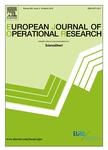版权所有:内蒙古大学图书馆 技术提供:维普资讯• 智图
内蒙古自治区呼和浩特市赛罕区大学西街235号 邮编: 010021

作者机构:Univ Oviedo Dpto Econ Cuantitativa Oviedo Spain
出 版 物:《EUROPEAN JOURNAL OF OPERATIONAL RESEARCH》 (欧洲运筹学杂志)
年 卷 期:1999年第117卷第1期
页 面:175-182页
核心收录:
学科分类:1201[管理学-管理科学与工程(可授管理学、工学学位)] 07[理学] 070104[理学-应用数学] 0701[理学-数学]
主 题:mathematical programming fuzzy sets fuzzy number fuzzy programming possibility distribution
摘 要:In conventional multiobjective decision making problems, the estimation of the parameters of the model is often a problematic task. Normally they are either given by the decision maker (DM), who has imprecise information and/or expresses his considerations subjectively, or by statistical inference from past data and their stability is doubtful. Therefore, it is reasonable to construct a model reflecting imprecise data or ambiguity in terms of fuzzy sets for which a lot of fuzzy approaches to multiobjective programming have been developed. In this paper we propose a method to solve a multiobjective linear programming problem involving fuzzy parameters (FP-MOLP), whose possibility distributions are given by fuzzy numbers, estimated from the information provided by the DM. As the parameters, intervening in the model, are fuzzy the solutions will be also fuzzy. We propose a new Pareto Optimal Solution concept for fuzzy multiobjective programming problems. It is based on the extension principle and the joint possibility distribution of the fuzzy parameters of the problem. The method relies on cc-cuts of the fuzzy solution to generate its possibility distributions. These ideas are illustrated with a numerical example. (C) 1999 Elsevier Science B.V. All rights reserved.